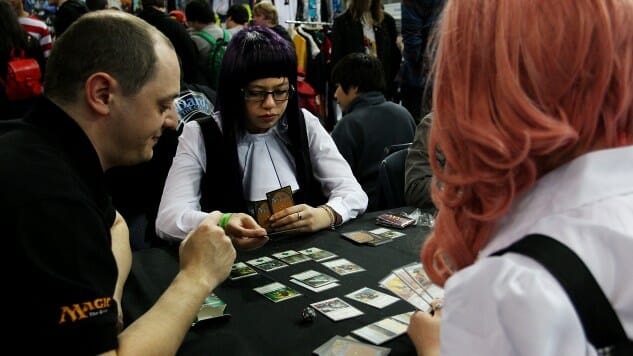
Magic: The Gathering is a game that focuses on direct, one-on-one competition. There’s maybe no better artifact of games ephemera that demonstrates this better than the Magic commercials that ran on MTV in the late 1990s. Important players of the day perform for an audience, showing their intense skills and abilities. These players are “tough.” If they don’t play well, they don’t eat. In these ads, Magic players are treated like bareknuckle brawlers, gladiators in the ring who are locked in an intense, monstrous contest that will end with one loser and one winner. Anything else is impossible.
It’s less goofy now, and it’s more serious in some ways, but both competitive and the general game of Magic hasn’t changed 20-something years later. If you go down to a local shop or look at the promoted sets released from Wizards of the Coast, you’re mostly going to see 1v1 competitions and cards that excel in that framework. Gladiators, still. Trash talkers, always. One winner, one loser, into eternity.
Slowly, but surely, I’ve backed away from that model of playing the game. The best experiences that I have had playing Magic over the last year have been in multiplayer formats, often those that Magic itself has put out. The re-release of products like Archenemy and Planechase, and the brand-new development of Explorers of Ixalan, lean into the social aspect of the game. This is not gladiatorial combat; it’s tabletop politics, negotiation and management of personalities in the room. It’s a different game, and it’s a better one.
I think that Magic: The Gathering is the most elegant game ever made. I think that learning it, and playing it with friends, is one of the most rewarding experiences you can have. I also, at the very same time, believe that the game repeatedly makes active, exploratory choices that hurt its ability to attract new players and hold onto old ones. The past year has seen multiple bannings in the Standard format, which is (at least theoretically) the first possible gateway to creating and developing your own decks for the game. Those bannings, which prevented players with playing with powerfulcards that they could open in booster packs, added a huge road block for new players. These players could, theoretically, open cards in booster packs they they purchased from any retail location that they could not play with. Alongside that, the price of large-scale competitive events have been increasing over the past few years, effectively pricing many people out of the most “gladiatorial” of one-on-one competitive experiences.
Magic’s digital experience is also expanding to specifically target the commonplace 1v1 experience with Magic: The Gathering Arena, an obvious Hearthstone competitor that is flashy, full of Magic’s unique mechanics, and (as far as I can tell) totally uninterested in the other ways that Magic can be played.
It’s in those other ways, the multiplayer ways, that the game really shines. While playing Planechase, I’ve accidentally turned every card in the game (literally every permanent that all four players controlled) into a small, stout beast. While playing Commander, the 100-card deck multiplayer format, I have forced each player to draw and then discard thirty cards in one swift action. Everyone laughs and shrugs, waiting for the next chance that they have to do the same thing to other players at the table. Even better, they sling idle threats and trash talk about the inevitability of their cruelty.
In these multiplayer formats, the stakes of “winning” are significantly lower for my playgroup. I play Magic with a group who have radically uneven skill levels; their play styles are often different or at odds; many of them don’t care to learn about the most intricate, fiddly rules. And they’re not wrong! Magic can create wonderful experiences, and those experiences are not because it has a robust, programmatic ruleset. Instead, those experiences mostly come from the brilliant, creative designs of the cards and the social act of talking about, and deploying, the strangest strategies in a group of people who all want to have fun.
Explorers of Ixalan should be making a bigger splash than it is. The Magic personalities at large talk about it as a product with “reprint value,” meaning that there are some expensive cards in it, but I think that kind of talk should be avoided. It leans into the social and the joyous parts of Magic that encourage players to talk, cooperate and hedge against each other in the mechanical exploration of a magical island. It’s a platform for social interaction; it’s the kind of gameplay that Magic, more than most games, can really help us get at. And Wizards’s investment in creating new, exciting experiences like this is a step in a direction that I really appreciate.
Grab Explorers or Planechase. Take it to your slightly-nerdy family gathering. Convince your brother-in-law to learn the basic rules of Magic. Talk about dinosaurs and vampires instead of what happened to whoever last year. Dig into what Magic does best.
Cameron Kunzelman tweets at @ckunzelman and writes about games at thiscageisworms.com. His latest game, Epanalepsis, was released last year. It’s available on Steam.